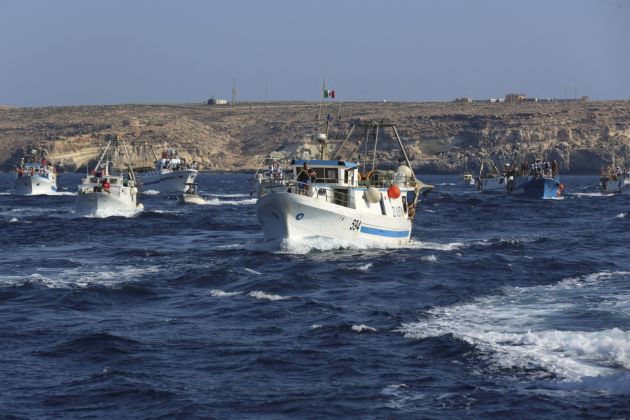No use pretending Europe's migrant response is working, warns UN expert

Stricken migrants washed ashore or plucked from sinking vessels in the Mediterranean and migrants trying to storm lorries crossing the English Channel are daily images on TV screens across the planet.
In Europe, migration of people has transformed from an election issue that can draw voters to extremist anti-foreigner parties to a full-blown crisis that is afflicting the EU and its neighboring countries.
The mass migration of people from mainly conflict-racked countries in the Middle East and the northern part of Africa is in the high tens of thousands each month.
It has the United Nations, NGOs and religious groups scrambling and calling for action.
Greece's coastguard said Aug. 24 it had recovered the bodies of two migrants who drowned when their boat sank, while another five were still missing, the BBC reported in what has almost daily become a routine event.
More than 33,000 people have landed on the Greek island of Lesvos in August and Amnesty International said they face "squalid" conditions because of shortages.
Germany expects to receive a record 800,000 refugees this year, more than the entire EU received in 2014 and about 1 per cent of the country's population, The Financial Times reported.
SCHENGEN ZONE
Senior government officials have warned that the Schengen zone, which allows free movement across most of the western and central European mainland, cannot be maintained unless other EU nations agree to take in asylum seekers.
While a coherent migrants' strategy is lacking, there is consensus that what is being done is not working and EU nations have been urged to be more open by both the U.N., the Holy See and other church-backed organizations.
François Crépeau, an international law professor at Montreal's McGill University, is the United Nations special expert on the human rights of migrants who sees the solution is seeking ways to find people to stay and not making them move.
The U.N. expert is notable in offering practical suggestions and not mere pontificating to overcome the European crisis which has other similar types of regional problems occurring on other continents such as in southeast Asia and in the Americas.
The U.N. Special Rapporteur on the human rights of migrants has called on the EU to establish a human rights-based, coherent and comprehensive migration policy which makes mobility its central asset.
"It is the only way in which the EU can reclaim its border, effectively combat smuggling and empower migrants," Crépeau said in an Aug. 25 statement.
'MIGRATION HERE TO STAY'
"Let's not pretend that what the EU and its member states are doing is working. Migration is here to stay," he stressed.
"Building fences, using tear gas and other forms of violence against migrants and asylum seekers, detention, withholding access to basics such as shelter, food or water and using threatening language or hateful speech will not stop migrants from coming or trying to come to Europe."
The UN special expert said European leaders should do more to open up and help migrants instead of spouting language that scorns their rights.
"Territorial sovereignty is about controlling the border, knowing who comes in and who leaves. It has never been about sealing the border to migration," Crépeau advised.
He noted that democratic borders are naturally porous by nature and that by giving migrants and asylum seekers legal and safe mobility solutions the countries with them will ensure such control.
Pope Francis, who is always fast in pinpointing crucial global humanitarian issues, on Aug. 20 announced he had chosen the theme of migrants challenging humanity for the 2016 World Day for Migrants and Refugees.
The Vatican said the Pope is urging Christians to reflect on works of corporal and spiritual mercy that include among them welcoming strangers.
The suggestions by the U.N. special expert have been on the list of Catholic organizations dealing with migrants such as Caritas and diaconical groups from other Christians traditions.
Only legal and safe pathways into Europe can help prevent massive sea drownings in the Mediterranean from happening, Doris Peschke, general secretary of the Brussels-based Churches Commission for Migrants in Europe had said in April.
"This includes increased refugee resettlement and lifting of visa requirements for people arriving from countries in conflict, like Syria and Eritrea. We need safe passages," noted Peschke.
Crépeau says that opening up the regular labor markets through smart visas and allowing people seek work and giving them incentivises to return if they don't find a job would allow better regulation and a controlled official labor market.
However, he warns that such measures must be backed with sanctions against employers who exploit irregular migrants in underground labor markets such as in agriculture, construction, care or hospitality.
"This would considerably reduce the pull factor they exercise on irregular migrants and further reduce the market for recruiters, smugglers and exploitative employers," the expert said.
"In addition, there is an obvious urgent need for Europe to create, jointly with other Global North countries, a massive resettlement program for refugees like Syrians and Eritreans."
This he says could offer protection to 1.5 or 2 million of them over the next five years.
Such a program would impact the market for smugglers and allow European countries to decide who comes and make appropriate preparations.